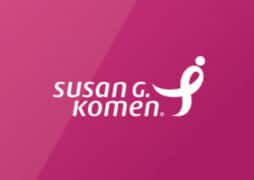Susan G. Komen® Commends Bill Introduction; Urges Quick Passage
RICHMOND – Susan G. Komen®, the world’s leading breast cancer organization, applauds Delegate Shelly Simonds (D-Hampton Roads) and Delores McQuinn (D-Richmond) for working with Komen to introduce legislation that would remove financial barriers to imaging that can rule out breast cancer or confirm the need for a biopsy. In 2023, more than 7,810 people will be diagnosed with breast cancer and more than 1,150 will die of the disease.
“This legislation can make an immediate impact for thousands of people who require diagnostic or supplemental breast imaging yet are unable to afford it and often forego the tests,” said Molly Guthrie, Vice President of Policy and Advocacy at Susan G. Komen. “Everyone should be able to access the care they need and afford it, especially when it could mean the difference between a person’s life and death.”
HB 1815, introduced by Delegate Simonds, would eliminate out-of-pocket costs for diagnostic and supplemental breast imaging (such as an MRI, ultrasound, diagnostic mammogram) when medically necessary. These exams can be extremely expensive and require people to pay high out-of-pocket costs – all before more expensive treatment even begins.
“We need this bill because women in our community are dying due to the barriers they currently face in getting the care they need,” said Delegate Simonds, “This bill shines a light on this reality and breaks down barriers to accessing vital breast imaging services for those in need. We all know that the earlier cancer is detected, the better the prognosis – not to mention the huge cost-savings of an early diagnosis versus a late-stage one. Too often, we see women delay getting a follow up exam, and by the time they are able to find the money and time to do so, their prognosis is worse. So many women often sacrifice their own health to afford putting food on the table and paying bills. This is both heartbreaking, and preventable. This bill will remove those barriers to care and will save lives.”
A Komen-commissioned study found the costs to patients range from $234 for a diagnostic mammogram to more than $1,021 for a breast MRI. The cost of the test prevents individuals in Missouri from getting the imaging they require, making it difficult to detect their breast cancer as early as possible.
An estimated 16 percent of people who receive annual screening mammograms nationwide get called back for diagnostic imaging. Additionally, these tests are often recommended for those who have previously been diagnosed with breast cancer and for some individuals who are considered at high-risk for breast cancer, making their out-of-pocket costs particularly burdensome to those individuals.
The use of breast cancer screening and follow-up diagnostics have led to significant increases in the early detection of breast cancer in the past 30 years. However, this is not true across all demographics.
Evidence shows that Black and Hispanic breast cancer patients tend to be diagnosed at a later stage, perhaps due to delays in follow-up imaging after abnormal findings on an annual mammogram.
More diagnostic and supplemental breast imaging is likely going to be needed due to “missed” breast cancers during the COVID-19 pandemic. Experts warn that missed mammograms could lead to more later-stage breast cancer diagnoses, once detected, so it is critically important that we increase access to affordable tests to those who medically require it.



